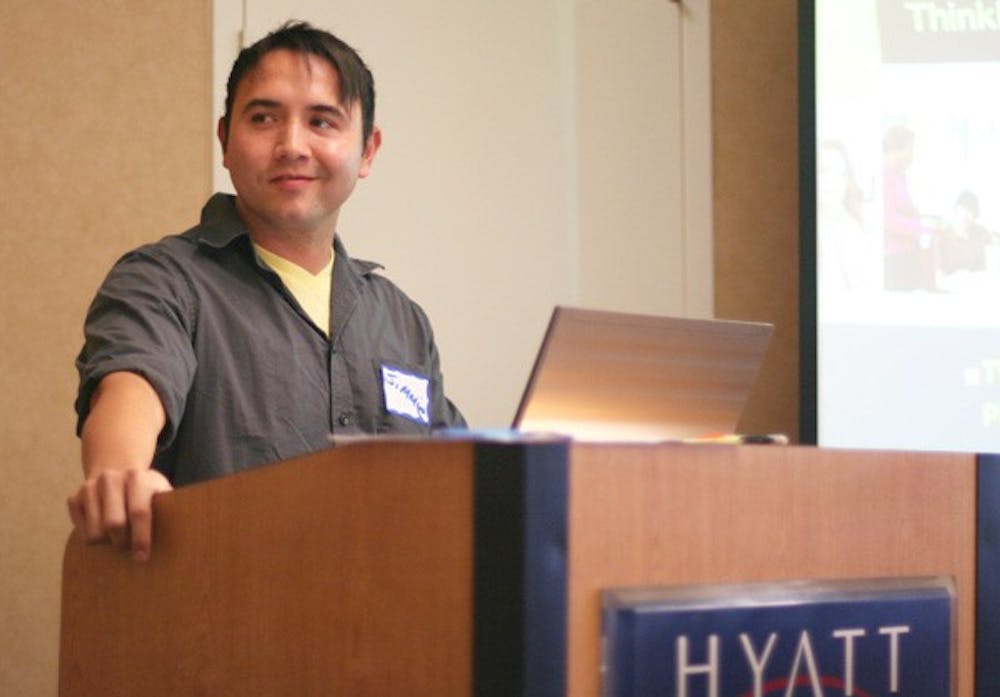Imagine being part of a minority orientation that you couldn’t help or change despite persecution. You constantly feel pressure to fit into a world that doesn’t seem to accept the way you act. You were thinking of being left-handed, right?
This situation was presented as an opening icebreaker activity to talk about sexual orientation and gender expression Monday at the 2011 Equity Leadership and Development Forum in downtown Phoenix.
Madelaine Adelman, an ASU associate professor in the School of Justice and Social Inquiry and the School of Social Transformation, explained how schools should become safe learning environments for all people, regardless of sexual orientation, gender identity or expression.
Adelman is also co-chair of the Phoenix chapter of Gay, Lesbian and Straight Education Network and works to create safe environments for K-12 students.
“Our goal is that participants gain confidence and learn about tools and resources to make small and large changes in their schools so that every student can learn in a healthy environment,” she said.
She was joined by Jimmie Munoz and Ang Soliz, both coordinators at GLSEN.
However, she said there is a “pipeline” that sends the negative after-effects of low self-esteem and harassment all the way to college. She frequently hears complaints from ASU students about their problems in classes and study abroad trips.
The forum is a two-day event on Monday and Tuesday, hosted by the Equity Alliance at ASU for the second year in a row as a continuation of forums started in 2005 by the National Center for Culturally Responsive Educational Systems, now a partner with the alliance.
The Equity Alliance at ASU is a nonprofit organization that promotes equity and justice for students in schools in Arizona, California, and Nevada.
The theme of this year’s forum was “Beyond the Sidelines: Let’s Get to Work,” with more than 60 presentations on civil rights, diversity, minorities in education and closing the achievement gap. Around 200 people attended from across the country.
“What we hope people take away are two things: professional learning and new ideas about how to organize schools to support the learning of students who have traditionally been underserved,” Elaine Mulligan, assistant director of ASU LeadScape and collaborator with the alliance, said in an e-mail. LeadScape is a program that’s part of the Equity Alliance.
Some of those underserved populations include English-language learners and students with disabilities. Mulligan hopes the forum will allow equity-minded educators to make connections, share ideas and support one another’s work.
“U.S. public education strives to be inclusive, and organizations such as GLSEN, along with research centers such as the Equity Alliance, help to push our public schools to live up to their aspirational standards,” Adelman said.
Soliz played popular, humorous PSAs by GLSEN and the Ad Council called “Think Before You Speak” that address use of offensive language.
“These are really useful in the classroom, in student groups and mentoring,” Soliz said. “It helps get the conversation going.”
Munoz presented statistics and problems outlined by the 2010 issue of National School Climate Survey, the only national survey that documents experiences of LGBTQ high school students in the U.S.
The four problem areas outlined were hostile school climates, absenteeism, lowered educational aspirations and academic achievement, and poor psychological well-being.
Sixty percent of students surveyed felt unsafe at school because of their sexual orientation. This was the highest reported reason, above gender expression and religion.
Adelman said negative biases target not only gay and lesbian students, but also all students by teaching them that it costs them respect and safety to be a little different.
“When we address these kinds of biases, all students will be able to thrive and be who they are,” she said.
But the session didn’t seek to just highlight problems.
“Those four problem areas are also counteracted with four things that we know work to make schools safer for LGBT students,” Munoz said.
Inclusive curricula, supportive educators, comprehensive policies and gay-straight alliances are the four solutions provided.
According to the survey presented, the percentage of students who felt unsafe because of their sexual expression at school decreased by 12.2 percent when there was a gay-straight alliance at their school, whether or not students joined.
Inclusive curricula include representation of LGTB individuals in textbooks and participating in the annual No Name-Calling Week, which happens every January.
Looking at ASU, Adelman said the University has strong yet generic policies about bullying, but needs to do more with implementation, specifically better with providing comprehensive training for faculty and staff and investing in LGTB advising.
Future gender-neutral housing — already available at UA — will also be a resource for students if the idea is passed at ASU.
She recommended students who want to make a difference should step up and get involved, whether by joining GLSEN or gay-straight alliances and voting in people at the state level who will support tolerant policies.
Reach the reporter at naberra@asu.edu





